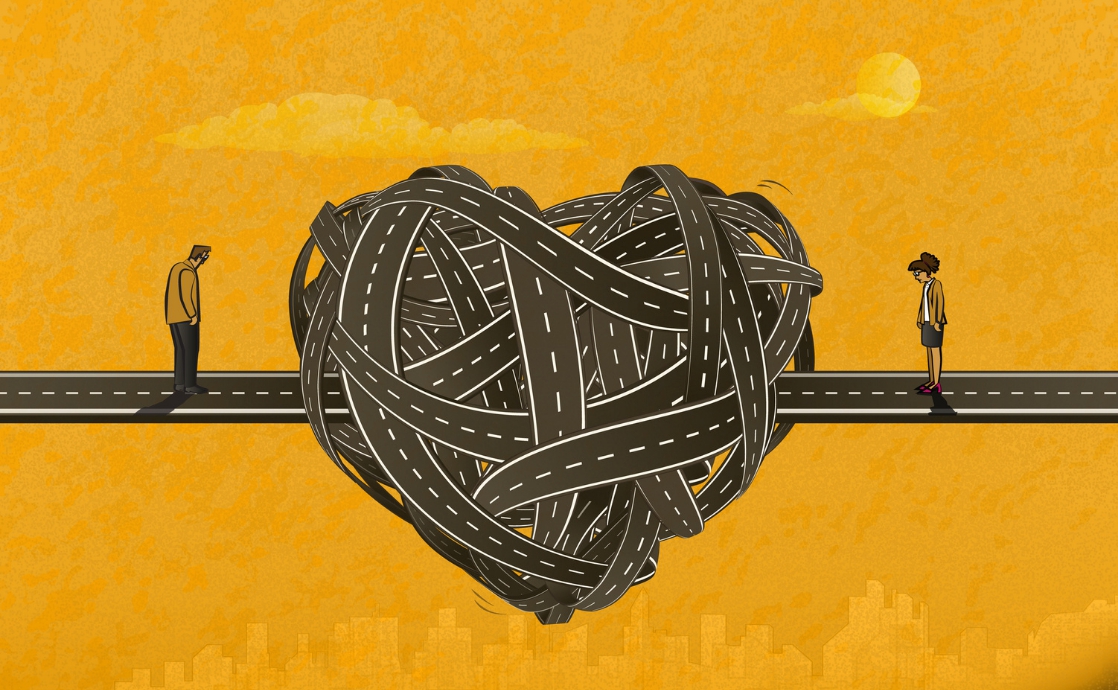The views expressed in our content reflect individual perspectives and do not represent the authoritative views of the Baha'i Faith.
The path to a Baha’i marriage begins when both people try to learn about the character of the person they’re thinking about sharing their life with, as Abdu’l-Baha explained:
Baha’i marriage is the commitment of the two parties one to the other, and their mutual attachment of mind and heart. Each must, however, exercise the utmost care to become thoroughly acquainted with the character of the other, that the binding covenant between them may be a tie that will endure forever. Their purpose must be this: to become loving companions and comrades and at one with each other for time and eternity.
RELATED: The Benefits of Waiting Before Divorce
Of course, not all marriages endure forever. Sadly, some end in divorce. People change over time; usually this change represents growth, but sometimes a person’s transformation veers onto a more destructive path. A couple can also grow in vastly different directions, to the point where those things that initially created a bond of unity have now become the primary cause of conflict.
A true Baha’i marriage, one in which “husband and wife should be united both physically and spiritually, that they may ever improve the spiritual life of each other, and may enjoy everlasting unity throughout all the worlds of God,” should afford space for each partner to continue on their own path of spiritual development, with each spouse supporting the other in that effort. Yet that is not always possible. Sometimes the gulf between them becomes too great.
Beyond Reconciliation
There are good reasons why some couples are actually better off divorced.
One clear-cut reason is physical abuse, in which case the requirement for the Baha’i year of waiting before divorce is waived entirely. But there are other reasons, too: some marriages are entered into without the partners having done their homework, so to speak, with the result that they not only lose their love over time, but even develop a strong aversion to each other.
Whether or not the marriage can eventually be reconciled, the year of waiting serves other purposes as well. In our analogy of the cardiac arrest patient in the first essay in this series, even after successful defibrillation a period of recovery and healing is needed to bring the heart back to normal functioning; and surgery may be required to repair a serious blockage. The same is true of the year of waiting. When married partners enter a year of waiting, each needs to heal from the pain and conflict that led up to the separation. For some, that healing may require therapy or counseling. Without healing, any reconciliation is prone to fail or prove short-lived, and even if the marriage cannot be saved, healing is essential before contemplating any future relationships.
As the partner who initiated the year of waiting in my marriage, one of the biggest issues I had to work through was an overwhelming sense of guilt. My ex-wife was not a bad person; in fact, I considered her in some ways to be my moral and spiritual better. But the root cause of our longstanding conflict — our different faiths, and more specifically the exaggerated emphasis on differences between them, as opposed to their obvious as well as subtle commonalities — had over the years built up an emotional barrier between us that would have made Hadrian’s Wall look flimsy by comparison. We did eventually begin marriage counseling, but instead of drawing us closer, those sessions served only to uncover additional, deeper divisions between us — divisions that were much more challenging, and in the end proved impossible to overcome.
It was undeniable that, despite having raised two beautiful children and enjoying what to outsiders may have seemed a reasonably good marriage, both of us were deeply, desperately unhappy. My feelings of guilt were partly caused by a recognition of my own failure to keep the marriage intact, and in no small part by fear that Abdu’l-Baha’s warning, “… if one of these two becomes the cause of divorce, that one will unquestionably fall into great difficulties, will become the victim of formidable calamities and experience deep remorse,” would be applicable to me.
In the end I had to seek personal counseling. I was blessed to know a Baha’i professional counselor and who, seeing me in distress, offered to help. When I brought up the subject of guilt, the counselor asked, “What could you have done differently to avoid the breakup of your marriage?” After pondering this question for a while, I could not come up with an answer.
Surely there were many things I might have done differently, but I honestly felt that none of those things would have changed the end result. Then, addressing the above quote by Abdu’l-Baha, the counselor suggested: “If a house is on fire, and you are running out of the house, it does not mean that you started the fire.” This realization was a great relief to me. By starting our year of waiting, I was simply acknowledging the fact that the house was on fire and getting myself to safety. Doing so did not mean that I was the cause of divorce, nor was it necessarily possible to point to a single person or event as the culprit.
It appears that, as is the case with so many Baha’i principles, there is a paradox at play, and it is for the individual to resolve that paradox, or at least to come to terms with it, in light of his or her particular circumstances. The paradox is this: in his Most Holy Book Baha’u’llah wrote on the one hand, “Truly, the Lord loveth union and harmony and abhorreth separation and divorce,” and on the other, “it is permissible for divorce to take place” upon completion of a year of waiting. If divorce were not justified under any circumstances, why would Baha’u’llah have permitted it? In The Hidden Words, speaking as a prophet in the voice of God, he reminded us, “I loved thy creation, hence I created thee.” Would God wish for any of his loved ones to live in misery for the rest of their lives?
RELATED: Just Married? Start Building Unity When the Marriage Begins
The Wisdom of the Year of Waiting
In my particular case, the year of waiting did not result in reconciliation. Although things looked promising in the first couple of months, later events transpired that closed the door for good. Was the year of waiting a failure? Of course not. God rarely provides a law that only serves a single purpose. Indeed, I discovered myriad wisdoms in this sacred law that have nothing to do with reconciling the marriage itself. As I will explain, observing the year of waiting not only results in countless blessings but also protects one from almost certain disaster.
This last point — protection — is perhaps a good one to address first. Especially in the West, people who divorce often quickly enter into “rebound” relationships. Those better qualified than me will have to speak on the reasons why people form these mostly casual relationships soon after a break-up, but I imagine they include a desire for validation and to have long-neglected physical or emotional needs met. In any case, I have never known a person who has been in a rebound relationship who did not regret it on some level.
Since most rebounds occur within a year of separation from one’s spouse or long-time partner, observing the year of waiting provides automatic protection against such ill-conceived pursuits. One of the first epiphanies that struck me after starting the year of waiting was that I was now in the unique and paradoxical position of being both unattached (in the sense of living as a single person) and unavailable (by virtue of being married and bound by Baha’i law). This realization was immensely liberating, and gave me license to truly be myself and to focus on my own emotional and spiritual healing and growth. In the next and final essay in this series, we’ll examine how the Baha’i year of waiting actually allows that kind of healing to happen.
















Comments
Sign in or create an account
Continue with Googleor